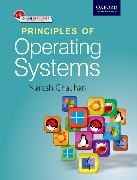Read more
Informationen zum Autor Naresh Chauhan is currently working as Professor and Chairman at the Department of Computer Engineering at YMCA University of Science and Technology, Faridabad. A PhD in Internet and Web Technology, Prof. Chauhan has a total work experience of about 22 years, including teaching. Other than teaching, he has also worked for several years in organizations such as Bharat Electronics Ltd and Motorola.Prof. Chauhan has published/presented several research papers in both national and international journals and conferences in the area of Search Engines, Focused Web Crawlers, Test Case Prioritization, and Agile Software Estimation and Agile Testing. His key interest areas are Internet and Web Technology, Software Testing, Operating Systems, and Embedded and Real-time Systems. He is also the author of Software Testing: Principles and Practices [OUP, 2010]. Klappentext Principles of Operating Systems is designed as a textbook for students of computer science, engineering, and computer applications. The book aims to acquaint students with the various aspects of operating systems, such as computer architecture, process management, memory management, file management, and input/output management. Zusammenfassung Divided into eight parts, the book tries to provide a comprehensive coverage of topics, beginning with OS architectures and then moving on to process scheduling, inter-process communication and synchronization, deadlocks, and multi-threading. Under the part on memory management, basic memory management and virtual memory are discussed. These are followed by chapters on file management and I/O management. Security and protection of operating systems are also discussedin detail. Further, advanced OSs such as distributed, multi-processor, real-time, mobile, and multimedia OSs are presented. Android OS, being one of the most popular, is discussed under mobile operating systems. The last part of the book discusses shell programming, which will help students perform the lab experiments for this course. The first six parts contain case studies on UNIX, Solaris, Linux, and Windows. ...

